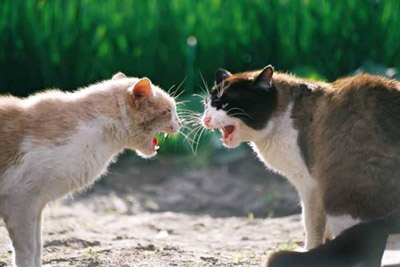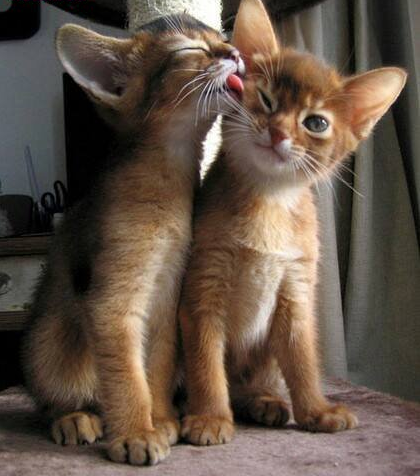"caring for cats"

Feline Vaccination
Feline vaccination is one of the most important cornerstones of cat welfare and has made major strides over the past few decades. It plays a pivotal role in maintaining your cat’s health, and should, therefore, be a central component of your ‘Cat Care’ regime from the moment that your feline friend joins your family.
Why vaccinate?
Just as most of us have had vaccinations to protect ourselves from a wide variety of infections and diseases, so our cats need this protection. Vaccines help to encourage your cat’s immune system to fend off numerous different infectious diseases, some of which can be lethal. The vaccination course in kittens starts from 9 weeks of age and a second injection is given 3-4 weeks later
Which Diseases?
- Cat Flu (FHV-1 and FCV)
Cat flu is not actually a single disease but is a combination of two different viruses (‘herpes’ and ‘calici’) which are the main causes of upper respiratory tract infections which can result in severe suffering and even death.The herpes virus (FHV-1) typically causes sneezing, conjunctivitis, runny eyes, excess salivation, and coughing. It can occasionally cause pneumonia and, in pregnant cats, abortion.The calicivirus (FCV) produces similar respiratory effects (although slightly less severe) but causes ulcers; usually on the tongue. It can also lead to chronic mouth problems including gingivitis, severe bad breath and leave the cat with extreme difficulty in eating.Both these viruses can lead to death and are extremely unpleasant for cats – leaving some with recurring bouts of the disease.Cat flu is highly infectious and therefore is particularly dangerous in multi-cat households, on farms, and in the feral cat population. Outdoor cats can easily catch cat flu from infected cats which they meet during their external wanderings. Fortunately most cat owners today are aware of this devastating disease and are now routinely vaccinating their cats – thus reducing the level of infection in the general cat population.
Fortunately most cat owners today are aware of this devastating disease and are now routinely vaccinating their cats – thus reducing the level of infection in the general cat population. - Feline Enteritis (feline panleukopenia) (FPV)
FPV is another highly infectious virus which is frequently fatal. It is closely related to the Parvovirus in dogs, and usually, starts with severe diarrhoea and vomiting resulting in life-threatening dehydration. It also attacks the bone marrow where white blood cells are produced, and this leads to a condition called ‘panleukopaenia’. If a pregnant cat becomes infected with FPV it can also result in brain damage to the kittens.The virus can persist in the environment for long periods, and therefore vaccination is the only real way to protect cats. - Feline Leukaemia (FeLV)
This is one of the rare occasions where we can definitely say that a virus infection can cause cancer. It is a disease which is passed from cat to cat by direct contact via saliva, shared feeding bowls, close face-to-face contact, and from bite wounds. The virus not only induces white blood cell cancers but also reduces the body’s immune system – leaving the cat open to secondary diseases. We have had a very reliable vaccine now for almost 20 years and again in general practice, we are seeing far fewer cases than previously. Vaccination against feline leukaemia is now considered to be routine, and most vets now include it automatically in the initial course of vaccinations.
We have had a very reliable vaccine now for almost 20 years and again in general practice, we are seeing far fewer cases than previously. Vaccination against feline leukaemia is now considered to be routine, and most vets now include it automatically in the initial course of vaccinations. - Other Diseases
A vaccine is also available for Rabies. In Britain, this is not compulsory unless you are intending to take your cat abroad. In that case, you need a pet passport and you should seek advice from your own vet as the rules and regulations do change from time to time.Chlamydia and Bordetella – are other respiratory infections for which vaccinations are available. These are usually used in multicat households, particularly in breeding colonies, and the use of these vaccines will be assessed by your vet as to the suitability and need for them.
Vaccination
It may be frightening to think about all these life-threatening diseases and infections which can destroy the wellbeing of our unsuspecting feline companions; but on the other hand it is comforting to know that the development and use of vaccines has progressed so far over the last five decades that we are greatly reducing the incidents of these illnesses.
In the past both cat flu and feline enteritis were rampant, resulting in prolonged periods of suffering and death for our cats. Nowadays there are far fewer cases, due mainly to caring cat owners understanding the need for vaccination. However, these diseases still walk our streets; and it is, therefore, vital that all cat owners talk to their vets to organise the very necessary vaccination program – some (but not all) will need annual booster vaccinations.
Reputable catteries will always insist that your cat is vaccinated and that vaccinations are up to date. This serves to demonstrate the fear of cross contamination, and the importance placed upon vaccinations as a preventative measure.
As with any medical procedure, there are the occasional side effects of vaccination, but these are extremely rare and usually very mild. Vaccines have to undergo stringent testing, and when part of a veterinary advised program they provide your cat with the critical protection he or she deserves.
January 2010Feline Ailments
"Better Safe Than Sorry"
Samuel Lover in 'Rory O'More' (1837)

 menu
menu